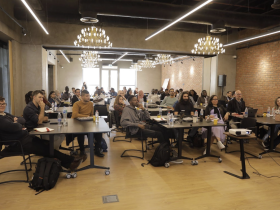Over the past year, Artificial Intelligence (AI) has dominated the global news cycle as experts across the world engaged in a spirited debate about its positive implications and potential drawbacks for our future. While uncertainties remain about how AI will impact our lives, the fact of the matter is that it will revolutionise the way we live our lives. One sphere that promises to benefit enormously from the power of AI is healthcare accessibility.
Arvind Raichur, Co-Founder and CEO of telehealth start-up Eagle Intelligent Health, says, “In some senses, AI has just passed its infancy with respect to its potential. When it comes to healthcare there are a couple of interesting ways that it is being utilised. What’s important is that it continues to develop as a tool to help healthcare professionals give the best possible care, to more people.”
He adds, “I am excited about the developments to come, but I would caution that those developments come with a balance of the ethics involved.”
Democratising access
As the country with the highest Gini coefficient in the world, South Africa faces challenges, and this extends to healthcare access. A significant portion of the population experiences limited access to medical services due to geographical, economic, and social barriers. However, in the digital age, AI and telehealth services can help play a significant role in levelling the playing field. By harnessing this potential, start-ups like Eagle Intelligent Health can take steps toward democratising access to healthcare, ensuring it becomes both accessible and affordable for all.
Raichur expresses his belief that, “In the next five to ten years, there will be an increased adoption and utilization of AI-enabled technology in healthcare, enabling physicians and the entire system to deliver improved care.”
Affordable healthcare in our grasp
Affordability remains a critical challenge in South Africa’s healthcare landscape too. The high cost of medical consultations, diagnostic tests, and medications often prevents individuals from seeking timely care. However, AI-powered healthcare platforms like Eagle Intelligent Health have the potential to disrupt this paradigm. According to data analytics firm Statista, only 17 in 100 South Africans have medical aid. The primary reason for this is cost. With AI-powered healthcare, South Africans would be able to access healthcare at a fraction of the cost.
By eliminating the need for physical infrastructure and streamlining processes, AI not only reduces overhead costs, but also helps increase the accuracy and quality of care, making healthcare services more affordable for both patients and providers. Moreover, the remote nature of AI-driven telemedicine reduces the burden on physical facilities, allowing healthcare professionals to serve a larger patient base without compromising the quality of care.
Raichur expresses anticipation for the next five to ten years, foreseeing increased utilization of AI-enabled technology to enhance healthcare delivery by physicians and the system at large, which fills them with great enthusiasm.
By harnessing the power of telehealth and AI-driven solutions, South Africa can pave the way for a more inclusive and equitable healthcare system, ensuring that every individual, regardless of their location or economic status, receives the care they need and deserve.
By leveraging AI technology, South Africa can bridge the healthcare access gap, make healthcare more affordable, and empower both healthcare professionals and patients. The potential for a more inclusive and equitable healthcare system is within reach, and the time to embrace AI for accessible and affordable healthcare is now.
























Leave a Reply